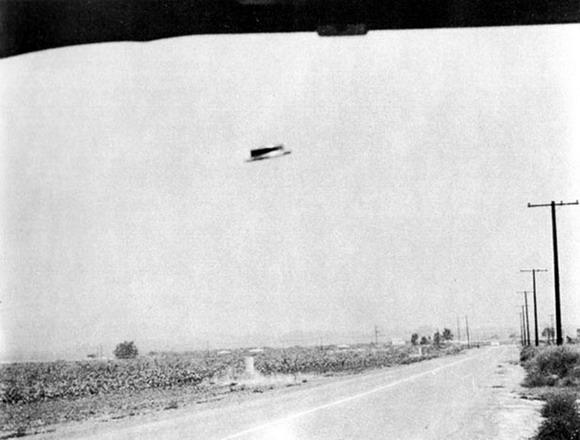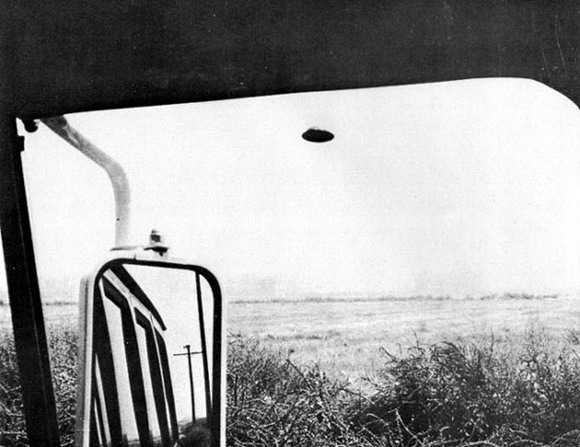Date:
August 3, 1965
Location: Santa Ana, California, United States
Rex
Heflin, an Orange County highway inspector, was at work
in a county vehicle at 12:37 P.M when he saw a hat-shaped
(disc with dome) object hovering above the road. He grabbed
his Polaroid camera and took three photographs of the
metallic-appearing object and a fourth of a black "smoke
ring" left behind by the object.


Source:
STUDIOVNI
Rex
Heflin, an Orange County highway inspector, was at work
in a county vehicle at 12:37 P.M when he saw a hat-shaped
(disc with dome) object hovering above the road. He grabbed
his Polaroid camera normally used to record highway obstructions
or other problems and took three photographs of the metallic-appearing
object and a fourth of a black "smoke ring"
left behind by the object after it departed at high speed.
He reported seeing a rotating band of light on the underside
of the object (like the sweep of a radar beam).
Heflin
twice tried to radio his base, during the sighting, but
the radio would not work. (It functioned normally after
the object departed.) One of the photographs was published
by the Santa Ana Register on September 20, 1965; then
the story was picked up by the national newswire services.
The
Los Angeles Subcommittee of NICAP, headed by Idabel Epperson,
conducted a thorough investigation of the case, including
a detailed character and background check, on-site investigation
and measurements (by engineer John Gray), and photoanalysis.
Both Heflin and the newspaper cooperated fully in the
investigation.
Computer
enhancement and photoanalysis was conducted by Robert
Nathan at the Jet Propulsion Laboratory, working with
first-generation prints and copy negatives made by the
newspaper. Among other things, the analysis established
photographic evidence to confirm the "light beam"
on the underside of the object. The Air Force issued a
statement declaring the photographs a hoax, which was
strongly disputed by NICAP. Nathan specifically ruled
out a model suspended by a string as the explanation.
Unknown
parties later attempted to tamper with the evidence and
manipulate information. The copy negatives were obtained
from Heflin under false pretenses, by someone pretending
to be from the North American Air Defense Command. (Click
here
for copy of letter from Lt. Gen. Wheless). Years later,
Bill Spaulding of Ground Saucer Watch using computer enhancement
techniques reported finding a line-like marking above
the object, suggestive of a supporting string, implying
that the UFO was hoaxed by using a small model. However,
the alleged "line" clearly was either an artifact
created by multigenerational copying of the photographs
or a deliberately introduced marking to discredit Heflin.
No such line was found in the originals by Nathan, the
newspaper, or NICAP analysts.
In
1993, MUFON photoanalyst Jeffrey Sainio re-examined Spaulding's
work and rejected the string hypothesis.
Technical
data: Polaroid Model 101,114 mm focal length, variable
aperture, built-in light meter, automatic settings; Type
107 black & white film, ASA 3000.
Conclusion:
"A highly credible, thoroughly investigated case
that meets all the criteria for significant evidence of
a real, structured, craft-like UFO." (Richard
Hall in The UFO Evidence, Volume II)
----------------------------
More
information:
At
noon on August 3, 1965 highway traffic engineer Rex Heflin
was driving near the Santa Ana freeway when he saw a UFO.
He stopped and snapped three Polaroid shots of it. He
reckoned it was 750ft (225m) away, at an altitude of 150ft
(45m), and 30ft (9m) in diameter. Although Heflin did
not report the sighting, on 20 September the Santa Ana
Register published the photos.
----------
UFOs
at Close Sight (Patrick Gross):
This
is a highly interesting and controversial case. The original
photos have been lost or confiscated and all subsequent
analyses have had to work from copies. While it is possible
for the photos to have been hoaxed, there has never been
any definite proof that they were, and Heflin has continued
to maintain their truth. Furthermore, these photos were
taken in the midst of one of the largest flaps in US history.
They are a highly credible, thoroughly investigated case
that meets all the criteria for significant evidence of
a real, structured, craftlike UFO, said NICAP investigator
Richard Hall in "The UFO Evidence, Volume II".
THE
HEFLIN CASE, SANTA ANA, 1965:
The
photos were examined by UPI (United Press International)
photographic specialists, who also took test photos with
the same equipment. They pronounced the photos genuine.
REPORT
SUMMARY:
"Rex
Heflin is a Highway Accident Investigator for the Los
Angeles County Highway Commission... he carried a Polaroid
camera...[which] contained film rated at 3000 ASA... [On]
Myford Road near Santa Ana... he spotted an unusual object
approaching the road. He stopped the truck, grabbed the
camera off the seat beside him and made three pictures
as rapidly as possible... As the object moved away, Heflin...
scrambled out of the truck and took his fourth and final
picture... Heflin tried to contact his office by radio
while the UFO was near [his vehicle], [but] the radio
refused to operate." The radio operated correctly
again after the object's departure. Heflin had a Polaroid
camera because he normally used it to record highway obstructions
or other problems.
Heflin
was reportedly approached by a man who claimed to be from
NORAD, to whom he gave the original Polaroids. Both NORAD
and the Air Force denied having the photos.
NICAP
investigators, including scientific advisors, also believed
the photos were genuine. They claimed that frame 1 shows
a swirl of material below the object, rising about a foot
in the air.
The
evening before, photos had been taken in Tulsa OK, Sherman
TX, and then five days later in Beaver Falls, PA two more
were taken. None of the photographed objects, however,
bore any resemblance to each other.
INVESTIGATIONS
SUMMARY:
NICAP:
The
Los Angeles Subcommittee of NICAP, headed by Idabel Epperson,
conducted a thorough investigation of the case, including
a detailed character and background check, on-site investigation
and measurements (by engineer John Gray), and photo analysis.
Both Heflin and the newspaper cooperated fully in the
investigation.
Richard
Hall:
"Computer
enhancement and other analysis was conducted by Robert
Nathan at the Jet Propulsion Laboratory, working with
first-generation prints and copy negatives made by the
newspaper. Among other things, the analysis established
photographic evidence to confirm the (reported) "light
beam" on the underside of the object. The Air Force
issued a statement declaring the photographs a hoax, which
was strongly disputed by NICAP."
Francis
Ridge:
"Heflin
said that he had turned over three of the four originals
to a man (or two men, the stories differ) who claimed
that he represented the North American Air Defense Command
(NORAD). NORAD denied that they had ever sent out an investigator
or indeed that they had the slightest interest in the
photos."
Bill
Spaulding:
Unknown
parties attempted to tamper with the evidence and manipulate
information. The copy negatives were obtained from Heflin
under false pretences, by someone pretending to be from
the North American Air Defense Command. Years later, Bill
Spaulding of Ground Saucer Watch using computer enhancement
techniques reported finding a line-like marking above
the object, suggestive of a supporting string, implying
that the UFO was hoaxed by using a small model.
Jeffrey
Sainio:
In
1993, MUFON photoanalyst Jeffrey Sainio reexamined Spaulding's
work and rejected the string hypothesis: the alleged "line"
clearly was either an artefact created by multigenerational
copying of the photographs or a deliberately introduced
marking to discredit Heflin. No such line was found in
the originals by Nathan, the newspaper, or NICAP analysts.
Sources:
http://www.ufoevidence.org/cases/case253.htm
http://www.ufoevidence.org/photographs/section/1960s/photo305.htm
